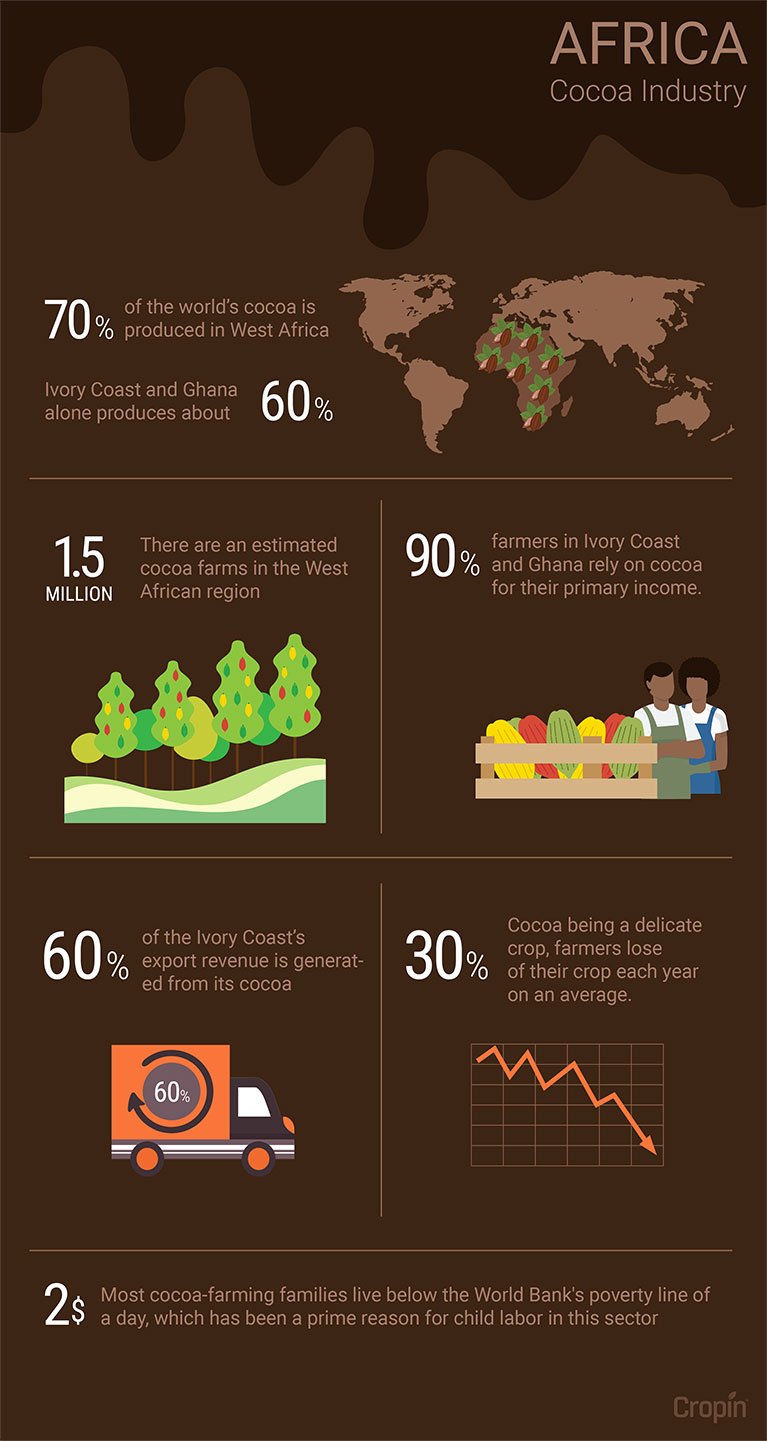Listen here:
Chocolate is one of the world’s most favored sweet treats, with an estimated global consumption of 7.2 million metric tons every year. The primary ingredient of chocolate is cocoa, made by processing the bitter beans of the cacao tree. Considered native to tropical regions of Mexico and Central and South America, and dating back to at least 1250 BCE, cacao trees are now cultivated in hot and humid climatic conditions near the Equator across four continents.
Cacao beans were once valued so much by the Aztecs that they used them as a form of currency. Presently, it is a widely-traded global commodity, 70% of which is cultivated by some of the countries in the West African region in nearly 1.5 million cocoa farms. Supplying at least 30% of the total cocoa production, the Ivory Coast (Côte d’Ivoire) ranks as the single largest producer, while Ghana, Nigeria, Togo, and Cameroon are other major producers in Africa.

Challenges in African Cocoa Industry
Although Africa leads in the global production of cocoa, the cultivation of cocoa is riddled with numerous challenges. Cocoa is predominantly produced on small- or medium-sized farms and depends heavily on manual labor.
Not only are cocoa plantations hard to monitor and maintain, but harvesting their bean-bearing pods also involves hazardous tasks such as spraying chemicals, hauling heavy loads over long distances, using sharp machetes, and working long hours under the hot sun. Additionally, the fruit-bearing pods don’t all ripen at the same time, and hence these trees demand close monitoring throughout the year.
Being a delicate crop, cacao trees are also easily affected by changes in weather and are highly susceptible to diseases and pests.
The cocoa industry is also quite notorious for the use and exploitation of children in cocoa production, particularly in the African region. Cocoa Barometer 2018, a comprehensive report on the current sustainability developments and highlights critical issues in the cocoa sector by a global network of cocoa-based NGOs and Trade Unions states that there are nearly 2.1 million under-age minors employed by cocoa plantations in the Ivory Coast and Ghana alone.
Given that households that depend on cocoa cultivation earn a daily wage of $0.78, which is less than one-third of the ‘living income’ of $2.51 as described by Fairtrade International, each person’s contribution makes a significant change to the many poverty-stricken households. Apart from that, the booming chocolate industry’s hunger for cheap cocoa in large quantities is also why children are made to toil in the plantations, doing hazardous tasks even without the basic safety measures. In some regions, children have also been trafficked to appease the need for cheap labor to meet production demands, while in some other extreme cases reporters have documented slavery and gross violation of human rights in some cocoa farms.
Lastly, one of the other factors that hinder African countries’ progress as a profit-generating sector is the fact that the producing countries export nearly all of their raw cocoa to Europe for processing and consumption. Cocoa by itself has little value, and large companies purchase cocoa in bulk to process it and market it in various forms of chocolate. Those along the supply chain, including traders, exporters, processors, and manufacturers demand a share of the profit for themselves, leaving those at the bottom — the cocoa producers — with very little bargaining power and not much of an income.
FACT
Nearly 40% of the world’s cocoa is consumed by Europeans every year, 85% of which is imported from West Africa.
Source: AfriKnowledgeBank
How Can The Cocoa Industry Benefit From The Adoption Of Agriculture Technology For Sustainable and Ethically-Sourced Cocoa?
Leading-edge agritech solutions have been enabling numerous agribusinesses and non-governmental organizations to achieve higher productivity and efficiency in the agriculture of various crops. To such effect, Cropin’s smart solutions that leverage satellite monitoring, big data, artificial intelligence, and machine learning have been validated by industry leaders as a robust solution for digitalizing and revitalizing farm practices, especially in developing nations with incredible potential for growth and expansion.
Enriching Quantity and Quality Of Produce
Cropin has successfully implemented its digital farm management solution in over 45 countries to remotely monitor and manage farmlands and empower agri-focussed organizations to achieve more sustainably with minimum inputs. By leveraging a potent combination of accurate ground data captured by trained field officers and big data gathered from remote sensing and AI technologies, Cropin’s SmartFarm provides actionable insights to organizations that increase agricultural productivity at a farm level. This, in turn, generates better revenue for the agri-produce and improves the livelihoods of cocoa farmers.
Furthermore, the management team with the support of agronomists and crop management experts can use using Cropin’s platform to configure a package of practices for the scientific and sustainable production of cocoa, in addition to early warning alerts for diseases to prevent significant crop losses.
Crop diseases can be better managed by field officers using SmartFarm’s user-friendly mobile application to capture images and share them with agronomists for timely action. This platform also provides periodic weather forecast notifications that enable farmers to protect their crops from ruinous conditions and ensure a more healthy harvest.
To sum it all up, Cropin’s agriculture technology platform provides a strong shoulder to cocoa producers to realize a harvest that is rich in terms of quantity and quality.
Traceability Solution For Ethical Sourcing
Unfortunately, most of the world’s chocolate companies are still unable to guarantee if the cocoa they procure is harvested and processed by a child. Although companies have been pledging for over two decades to ensure that cocoa is being ethically sourced, no concrete measures have been taken to achieve the same.
The lack of a powerful solution that makes the flow of raw ingredients along the supply chain transparent proves as a challenge for chocolate companies to even trace back to the exact farm that produced the cocoa. On the other hand, the lack of credible farm and farmer data makes it difficult for cocoa traders also to establish the precise source of cocoa during certification processes.
Transparency along the supply chain thus becomes the need of the hour in such circumstances, for which Cropin provides optimum end-to-end traceability and visibility over farming operations.
FACT
Mars, the maker of M&M’s and Milky Way, can trace only 24% of its cocoa back to farms; Hershey, the maker of Kisses and Reese’s, less than half; Nestlé can trace 49% of its global cocoa supply to farms.
Source: The Washington Post (2019)
SmartFarm enables cocoa-producing companies to configure and monitor farming practices as stipulated by certification services such as GlobalG.A.P. and Fairtrade and record each activity as per the requirement. Organizations can thus regulate and track critical parameters that impact the quality and working conditions of farmers. The organization can then extract this digital record of farm activities in the form of a comprehensive report and submit it for quality certification purposes. Alternatively, the management team can also configure customized reports in the application to extract key information from events and activities recorded in the application previously.
SmartWare is Cropin’s pack-house solution that extends SmartFarm’s offerings to facilitate end-to-end traceability of produce beyond the point of harvest too.
The digitization of all farm activities using agriculture technology brings about transparency in the field and traceability of all farming activities. As a result, organizations have an upper hand when seeking approval for export to other markets. The data collected from the farm using Cropin’s platform throughout the cultivation of cocoa allows traders to ascertain the origin and ethicality of the produce, exactly to the farmer and farm where it was cultivated.
FACT
Mars, the maker of M&M’s and Milky Way, can trace only 24% of its cocoa back to farms; Hershey, the maker of Kisses and Reese’s, less than half; Nestlé can trace 49% of its global cocoa supply to farms.
Source: The Washington Post
The Right Price For The Choicest Cocoa
Innovative solutions such as Cropin’s are paving the way for farming that is profitable for all the key stakeholders in the agri-ecosystem. By establishing a digitally-powered system to manage farm activities, cocoa producers can now realize high-quality produce that attracts more generous rewards for the farmers as well.
Cropin’s platform also prevents unethical practices right at the source, and the traceability feature further validates the same during certification processes and enables producers to earn a premium price for conforming to ethical practices during production.
Cropin’s recent strategic partnership with Rainforest Alliance is a remarkable step toward co-developing and perfecting ‘CocoaSense’, a future-ready farming solution that will leverage AI and satellite imagery to facilitate cocoa farmers in the management and monitoring of crops in a more accurate, affordable, and scalable manner.
The vision for CocoaSense is to bring about an integrated offering that starts with structured data aggregation and finishes with predictive and prescriptive intelligence — intel that is delivered to the individual growers (agronomy advisory) and to the organizations invested in setting them up for success, including:
-
the co-operatives they transact amongst
-
the banks they borrow from
-
the traders they sell to and
-
the standards they certify with
Building the cocoa-specific remote-sensing data product on Cropin’s existing platform interface is what makes it possible to solve the complexities associated with smallholder livelihoods in a lean manner.
Through this collaboration, Cropin will impact every bite of chocolate and other related products made of cocoa sourced from farms in Ghana and the surrounding regions. Cropin also intends to support SAT4Farming’s underlying objective to triple the average yields of Ghanaian cocoa farmers’ to 1,500 kg per year through innovations in farming.
In the long run, Cropin endeavors to bring about a sustainable production of cocoa that is free of child labor globally. This can be strengthened further by introducing traceability in the supply chain and fetching a premium for responsibly produced cocoa.










